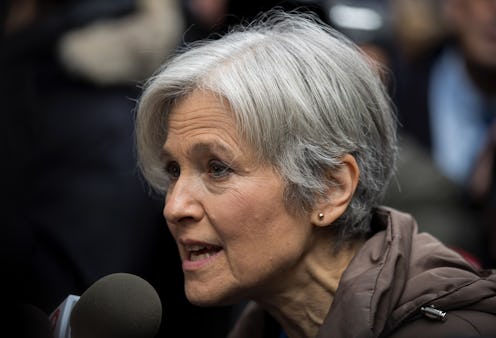News
Twitter Is Calling Jill Stein A “Russia Puppet” — Here’s Why

On Sunday, former Green Party presidential candidate Jill Stein gave an interview on MSNBC in which she defended the North Korean government, criticized U.S. sanctions on Russia, and defended Russia against accusations of election interference. Now, a good chunk of Twitter is calling Stein a "Russia puppet," and there are a few reasons for that.
Stein touched on many things in the interview. She pointed out the vulnerability of America's election systems, condemned the "demonization" of the North Korean government, and said that the evidence of Russian interference in the election "is not definitive." She also criticized the latest round of of U.S. sanctions against Russia, claiming without elaboration that "sanctions only strengthen a leader."
In her interview with Alex Witt, Stein pushed back against the claim that North Korea had engaged in "provocation" of South Korea in recent years by firing missiles and conducting nuclear tests. She noted that until the end of the Cold War, the U.S. had nuclear weapons stationed in the South — and that because of this, the North Korean regime had been "cornered into feeling like they have to develop a nuclear weapon."
Her comments rankled some viewers, however, for a number of different reasons.
Stein argued that South Korea and the U.S. were guilty of provoking North Korea, not the other way around. But she didn't acknowledge that, unlike North Korea, South Korea hasn't developed its own nuclear weapons, withdrawn from the Nuclear Nonproliferation Treaty, or conducted intercontinental ballistics missile tests that violate United Nations resolutions. (Incidentally, South Korea also doesn't imprison its own citizens in Soviet-style gulags, as North Korea does, although the interview didn't touch on that.)
Stein's claim that U.S. sanctions against Russia actually benefit the Russian government also raised eyebrows. She asserted that sanctions "play right into Russia's hand" — but all reporting suggests that the last round of sanctions have taken a serious toll on Russia's economy, specifically on state-run businesses.
It's important to look at Stein's comments in context, though.
Firstly, it's entirely possible that Stein's candidacy diminished Clinton's vote share, either by either attracting voters that might have otherwise gone to the Democratic ticket or by turning public sentiment against Clinton (Stein focused most of her campaign ire on Clinton during the election). Separate from that is the fact that the Russian government actively interfered with the 2016 election with the goal of electing Trump, according to multiple U.S. intelligence agencies.
And last but not least, there is a photograph, taken at a state function in Moscow back in 2015, of Stein sitting at a dinner table with Russian President Vladimir Putin. Stein also spoke with Russian Foreign Minister Sergei Lavrov in New York during her campaign.
In and of themselves, those facts don't prove anything. But they do give a context to Stein's remarks on Sunday, and several of her comments — specifically those in which she defended North Korea, a Russian ally, and criticized American sanctions against Russia — suggested to some viewers that, wittingly or unwittingly, Stein was being used by the Russian government to swing the 2016 election to Trump.